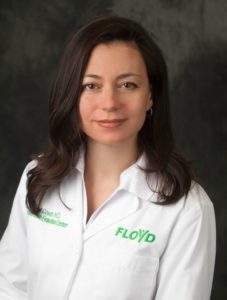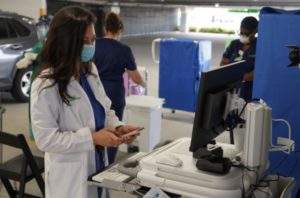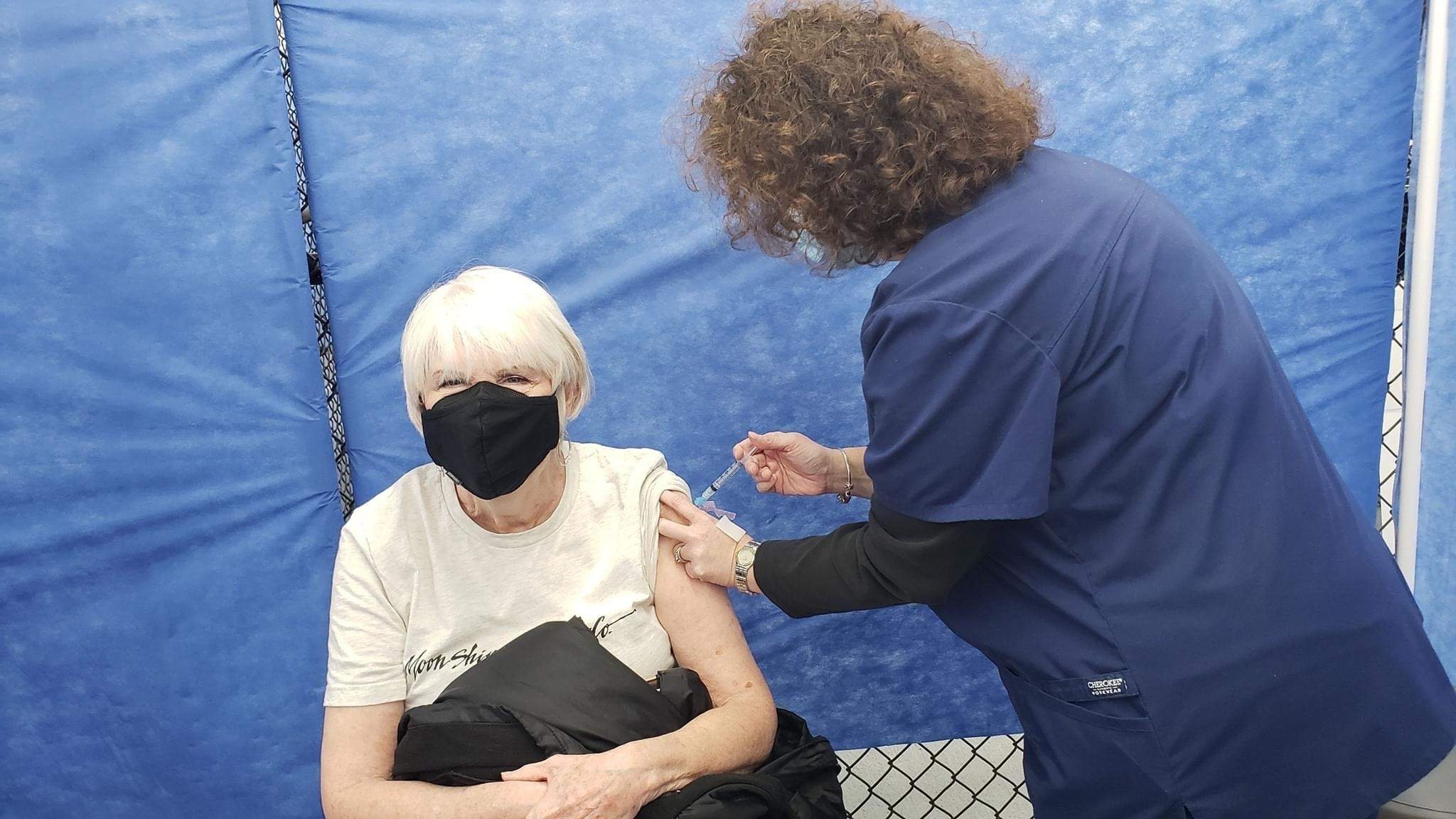The Floyd Medical Center COVID-19 vaccination clinic is making great strides toward increased vaccine awareness thanks in no small part to Dr. Anne Cowan who runs the initiative with the efficiency and empathy needed to inform her community. Read more about her motivation in our Profile of Courage story:
________________________________________________________

Dr. Anne Cowan values the small-town charm, familiarity, and goodwill she feels since moving to Rome, Georgia over a dozen years ago. “Being able to have that personal connection in a small community can really translate into some amazing medical care,” she has discovered. “People are able to work with each other on a level that would be difficult in a larger metro area.”
Such awareness and collaboration proved instrumental as the anesthesiologist at Floyd Medical Center spearheaded the development of the hospital’s Preoperative Evaluation Center (PEC) for which she serves as Medical Director.
The PEC emerged as she recognized an opportunity to enhance the care continuum by filling a gap. “The hospital was doing more complex cases and didn’t have the infrastructure to do the kind of comprehensive evaluation necessary to avoid last-minute cancellations and complications,” she recalls.
“The organization recognized a growing need for expertise in perioperative medicine and turned to their Anesthesiologists for help. The goal of the clinic was to make the process more efficient for the patient and everyone else, reducing complications and increasing satisfaction.”
Plotting the Points Towards Vaccine Awareness
The logistical success of this approach offered a template for managing an unprecedented crisis as the pandemic took hold in early 2020. With Dr. Cowan an active member of a leadership team brainstorming strategies to address everything from optimal PPE to efficient patient-screening to streamlined COVID-19 testing, the PEC assumed an integral role in the Floyd Medical response to COVID-19.
“At the pre-op clinic, we were going to be responsible for all the testing,” she explains, “so, in May 2020, we developed a drive-through system adjacent to one of the field hospitals — we have a 20-bed GEMA unit that sits in the parking lot and a field hospital with around 150-200 beds that, thankfully, we’ve never had to use for overflow.”
Following initial vaccine approvals in December 2020, the Floyd team rolled out vaccination initiatives as part of their COVID-19 response. Dr. Cowan sees the Floyd COVID-19 vaccine clinic as a natural evolution of their COVID-19 testing initiatives.
“We began to receive vaccines very early on in this area,” Dr. Cowan reports. “We were one of the first to get shipments. It’s a massive team effort. We knew we had this vaccine, that we had a good space, and we had some great workflow.”
 Her team has also been able to contribute solutions to some of the issues surrounding vaccination scheduling. “You’re probably aware of stories about people surfing the sites and hitting refresh,” she references. “Early on that was a huge deal. We were already using an electronic booking system for scheduling some of our COVID-19 swabs.”
Her team has also been able to contribute solutions to some of the issues surrounding vaccination scheduling. “You’re probably aware of stories about people surfing the sites and hitting refresh,” she references. “Early on that was a huge deal. We were already using an electronic booking system for scheduling some of our COVID-19 swabs.”
“Patient engagement can be so inefficient, trying to reach patients by telephone and the back-and-forth,” Cowan details. “We deal with that every day in the pre-op clinic, and we dealt with that with some of the initial vaccine supply, so I shared software solutions which allowed us to connect the people to the vaccine. Collaboration with Floyd’s Lean Six Sigma Director Brandi Skeen and Director of Emergency Preparedness Ben Rigas led to a rapid escalation in volume. In the first week we opened we were doing about 25 shots a day, and now we are up to 400-500 a day.”
Making a Community Engagement Plan for Vaccination
Dr. Cowan attributes the increase in vaccination appointments to expanded public awareness of eligibility. “We weren’t getting the message across as to who was eligible according to the Georgia state eligibility guidelines,” she believes. “There could be no national messaging on this because it was different for each state. While I agree with having local solutions to some of these universal problems, there are some unique challenges that poses. It gets confusing for the public.”
Confusion often engenders reluctance and uncertainty, harming vaccine confidence and hindering vaccination efforts. “We have a lot of vaccine hesitancy in our area, which means we have a significant vulnerable population who is at risk of getting sick and overwhelming our hospital systems again,” she warns.

“We’re addressing it one person at a time. We’ve been micro-educating here — doing a talk for a whole office or talking to a patient for 15-20 minutes, answering all their questions, hoping that maybe they’ll talk to friends and then maybe we’ll continue to go in the right direction. I think you need a loud, well-respected, powerful voice who is shouting from the mountaintops: ‘This is great! This is good, you need to do this!’”
Taking the Plan Forward
 She hopes those voices carry far beyond computer networks and smartphones, so rural patients hear important information. “After vaccine education, lack of internet and transportation are probably the two biggest barriers,” informs Dr. Cowan. “We have a phone system, and that’s almost a full-time job to keep up, but we don’t want people out there who want the vaccine to not be able to get it because they couldn’t schedule it online.”
She hopes those voices carry far beyond computer networks and smartphones, so rural patients hear important information. “After vaccine education, lack of internet and transportation are probably the two biggest barriers,” informs Dr. Cowan. “We have a phone system, and that’s almost a full-time job to keep up, but we don’t want people out there who want the vaccine to not be able to get it because they couldn’t schedule it online.”
“We’re now getting to the transition point where we’re probably going to move away from the centralized large vaccination sites and out to the urgent care and primary care networks,” she continues.
“Just to try to spread vaccination initiatives and opportunity over a larger geographic area. I’m hopeful that will help folks who might be able to get a ride to their nearest urgent care when maybe they can’t make it all the way over to the hospital.”
Her team is also investigating options for community pop-up vaccination events. “We decided that we need to go meet people where they are and it’s been working really well,” she confirms. “We’ve gone to our housing authority and gone to our churches and soup kitchens. We’ve called up folks deeply connected to these populations asking, ‘What’s the best time, where’s the best place, how many people do you think we should ballpark plan for, we’ll be there!’” The success of these pop-up vaccine clinics has inspired future plans for continued public health initiatives in collaboration with community partners.

Dr. Cowan’s strong history of public health outreach gives her a network to help identify the underserved segments of their community. For several years, she’s served on the Opioid Taskforce for the Medical Association of Georgia (MAG) battling the opioid epidemic and addressing its impact.
“In the pre-op clinic we see all kinds of patients,” she reflects, “who don’t have a primary care physician, who have very difficult circumstances, who are in and out of urgent care … I guess seeing that part of it, outside the operating room, inspired me to use other parts of my medical education to be part of a solution as much as I can.”
Increasing Public Confidence in Vaccines
Despite some of the confusion, she glimpses the proverbial dawn on the horizon. Dr. Cowan breathes a cautiously optimistic sigh as she reveals, “We are definitely seeing a sustained decline in hospitalizations. The drive-thru testing that we do for surgery patients is interesting because it tends to give us a heads-up with what’s happening in the community. We’ve been actually using that data, which I tally every week to share with the leadership group, as a litmus test to see what the community spread is in our immediate population. I’m encouraged.”
 Watching more people take charge of their health and seek out vaccination also sparks joy for her. “I now call that vaccine center ‘The 2nd Happiest Place on Earth’ because it’s next to Disney!” she praises. “It’s really uplifting to be part of it. Everyone who is there, wants to be there, from the people working it to the people showing up to get shots. We have people crying tears of joy because they are finally getting a vaccine. We have lots of stories of folks coming in who have lost a parent or sibling or friends and they feel like they can’t do anything, but here’s one thing they can do. They can get vaccinated. Those types of interactions after the last year… just to be able to be part of this has been a huge morale booster for me. It’s kept me going for sure.”
Watching more people take charge of their health and seek out vaccination also sparks joy for her. “I now call that vaccine center ‘The 2nd Happiest Place on Earth’ because it’s next to Disney!” she praises. “It’s really uplifting to be part of it. Everyone who is there, wants to be there, from the people working it to the people showing up to get shots. We have people crying tears of joy because they are finally getting a vaccine. We have lots of stories of folks coming in who have lost a parent or sibling or friends and they feel like they can’t do anything, but here’s one thing they can do. They can get vaccinated. Those types of interactions after the last year… just to be able to be part of this has been a huge morale booster for me. It’s kept me going for sure.”
_____________________________________________________
California native Dr. Anne Cowan graduated from Middlebury College with a B.A. in Neuroscience before heading to medical school at The Johns Hopkins University. She then went on to the University of Michigan for a residency in anesthesiology.
Dr. Cowan practices anesthesiology at Floyd Medical Center in Rome, Georgia where she also serves as Medical Director of Perioperative Medicine. She and her husband, neurosurgeon Dr. John Cowan, along with their children, also make their home in the Rome area.





